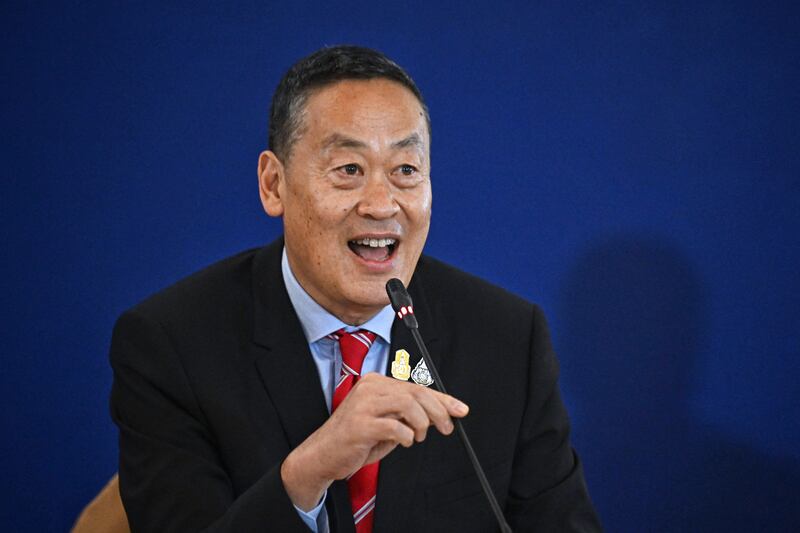Thailand will begin enrolment in August for its controversial 450 billion baht ($12.5 billion) plan to hand out cash to millions of citizens to revitalize its flagging economy, the country’s finance minister said Wednesday.
The one-time handout of 10,000 baht (U.S. $277) each to around 45 million Thais is expected to be distributed in the fourth quarter and cannot be spent on items such as weed, alcohol and tobacco, the plan stipulates.
“This isn’t just a simple cash handout. It’s a comprehensive effort to revitalize our entire economic system,” Finance Minister Pichai Chunhavachai said at a press conference.
Some analysts as well as the main Thai opposition party criticized the plan, which the government calls a digital wallet scheme. They said it would barely reinvigorate the economy, may have financial implications and will not be sustainable.
However, Pichai said economic stimulus was urgently required.

Thai Prime Minister Srettha Thavisin has said the Thai economy, Southeast Asia’s second largest, is in “crisis.”
The Thai central bank in April lowered its 2024 economic growth forecast to 2.6% from 2.5%-3.0%, reported Reuters news agency.
Pichai said that the infusion of cash would lead to economic “whirlwinds” or “storms, and have four major economic impacts.
It would stimulate the grassroots economy, boost spending in small and large stores, encourage spending among large businesses, and trigger economic activities to revive productive industries and enhance confidence.
The Pheu Thai Party announced a cash handout as a campaign promise in April of 2023, a little over a month before the general election, in which it won the second-largest number of seats. It then became part of a coalition government that excluded the largest seat winner, the Move Forward Party.
Eligibility
Qualified citizens can enroll in the digital wallet program from Aug. 1 until Sept. 15.
Those eligible to receive the handout must, among other things, be 16 years or older, have income not exceeding 840,000 baht in the 2023 tax year and not be serving a prison sentence.
“Please have confidence that we clearly have sufficient financial resources to carry out the project. There are about 50.7 million eligible citizens, but we expect about 45 million participants,” Chulaphan Amornvivat, the deputy minister of finance, said at the press conference.
“Therefore, a total budget of 450 billion baht has been prepared.”
He said the cash handout would be funded with 165 billion baht from the 2024 budget and 285 billion baht from the 2025 budget.
Recipients have to download an app to their smartphones and the government will transfer the money to their accounts on this app. The app will not allow cash withdrawal.
Those who do not have a smartphone must register in person.
‘Unclear impact’
Thai Assistant Minister of Finance, Phaopoom Rojanasakul, did not have an estimate of the economic impact of the cash handout “because this project is not like other past projects, and [the government] is unable to provide academic references.”
Opposition lawmaker from the Move Forward Party, Sirikanya Tansakul , said he was concerned about the project, especially the lack of clarity about its impact.
“The Ministry of Finance, the National Economic and Social Development Council (NESDC), and the Bank of Thailand have all stated that the project will not stimulate more than 1% of GDP,” Sirikanya said.
Sirikanya was not confident about the technology of the digital wallet.
“The payment system is very complex. Once the digital money is distributed, will it appear in the recipient’s wallet without any losses along the way” he said.
“Therefore, it is highly likely that it will not be ready for distribution in the fourth quarter.”
If the stimulus works, the government would become significantly more popular, said Isa Gharti, a public policy researcher at Chiang Mai University.
If it does not work, it could have implications for the government and the economy, she said.
“The project has advantages in terms of short-term economic stimulation and assisting low-income earners. But there are concerns about sustainability and [causing a] fiscal burden,” she told BenarNews.
“If it fails, it could lead to a crisis of confidence [for the government].”
What the government needs is to urgently address long-term economic issues by tackling economic inequality, she said.
“The government should focus on creating political and economic stability,” she said.
“Although this may not be achieved immediately, we should see signs of this from the civilian government.”
